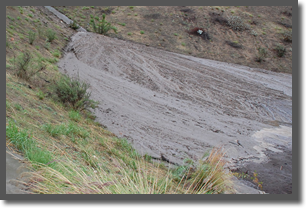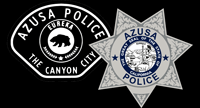Storms And Mudslides
 Landslides are defined as masses of rock, earth or debris moving down a slope. Whether moving slowly and causing damage over a long period of time, or rapidly moving causing immediate damage, landslides are extremely dangerous. Fire stricken areas, such as the area burned by the Colby Fire in January of 2014, are susceptible to landslides. Landslides usually occurr during heavy rainfall.
Landslides are defined as masses of rock, earth or debris moving down a slope. Whether moving slowly and causing damage over a long period of time, or rapidly moving causing immediate damage, landslides are extremely dangerous. Fire stricken areas, such as the area burned by the Colby Fire in January of 2014, are susceptible to landslides. Landslides usually occurr during heavy rainfall.
Debris flows, which are also known as mudslides, are a common, fast-moving landslide.
Prepare
![]() In the event a landslide occurs here in Azusa, please know you can receive up to date information through our social media channels, such as www.Facebook.com/AzusaPD, www.Twitter.com/AzusaPD and this website. For emergency alerts and messages, please sign up for our Nixle Alerts using the module to the left, or by visiting www.Nixle.com. Also, consider doing the following:
In the event a landslide occurs here in Azusa, please know you can receive up to date information through our social media channels, such as www.Facebook.com/AzusaPD, www.Twitter.com/AzusaPD and this website. For emergency alerts and messages, please sign up for our Nixle Alerts using the module to the left, or by visiting www.Nixle.com. Also, consider doing the following:
- Learn about local emergency response and evacuation plans
- Talk to everyone in your household about what to do if a landslide occurs
- Create and practice an evacuation plan for your family and your business
- Assemble and maintain an emergency preparedness kit
- Become familiar with the land around where you live and work so that you understand your risk in different situations
- Watch the patterns of storm water drainage on slopes near your home, especially where runoff water converges.
How To Load Sand Bags
For January 2015: Sandbags and sand is available at LA County Fire Station 32 at 605 N. Angeleno Avenue and at the Azusa Public Works at 809 N. Angeleno Avenue. Sandbags only are available at LA County Fire Station 97 at 18453 E. Sierra Madre Avenue.
During A Severe Storm
 Please be cognizant of the following during a severe storm:
Please be cognizant of the following during a severe storm:
- Stay alert and awake. Many deaths from landslides occur while people are sleeping.
- In the event of a power outage, listen to local news stations on a battery-powered radio for warnings of heavy rainfall. Consider leaving if it is safe to do so.
- Stay connected to Azusa PD through our social media channels and Nixle alerts.
During A Landslide
 Please take the following steps in the event you believe a landslide is occurring:
Please take the following steps in the event you believe a landslide is occurring:
- If you suspect imminent danger, evacuate immediately.
- Inform affected neighbors if you can, and call 911
- Listen for unusual sounds that might indicate moving debris, such as trees cracking or boulders knocking together.
- If you are near a stream or channel, be alert for any sudden increase or decrease in water flow and notice whether the water changes from clear to muddy. Such changes may mean there is debris flow activity upstream so be prepared to move quickly.
- Be especially alert when driving— watch for collapsed pavement, mud, fallen rocks and other indications of possible debris flow.
- If you are ordered or decide to evacuate, take your animals with you. Consider a precautionary evacuation of large or numerous animals as soon as you are aware of impending danger.
After A Landslide
 After a landslide, it's important to stay away from the slide area, as well as:
After a landslide, it's important to stay away from the slide area, as well as:
- Check for injured and trapped persons near the slide, without entering the direct slide area. Direct rescuers to their locations.
- Help a neighbor who may require special assistance–infants, elderly people, and people with disabilities. Elderly people and people with disabilities may require additional assistance. People who care for them or who have large families may need additional assistance in emergency situations.
- Listen to local radio or television stations. or our social media channels for the latest emergency information.
- Watch for flooding, which may occur after a landslide or debris flow. Floods sometimes follow landslides and debris flows because they may both be started by the same event.
- Look for and report broken utility lines to appropriate authorities. Reporting potential hazards will get the utilities turned off as quickly as possible, preventing further hazard and injury.
- Check the building foundation, chimney, and surrounding land for damage. Damage to foundations, chimneys, or surrounding land may help you assess the safety of the area.
- Replant damaged ground as soon as possible since erosion caused by loss of ground cover can lead to flash flooding.
- Seek the advice of a geotechnical expert for evaluating landslide hazards or designing corrective techniques to reduce landslide risk. A professional will be able to advise you of the best ways to prevent or reduce landslide risk, without creating further hazard.
